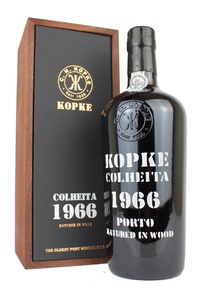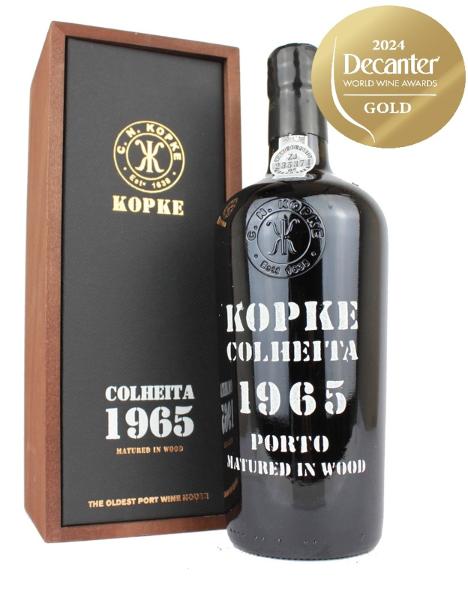Kopke, 1966 Colheita Port
Colheita Port
In Kopke Presentation Box
Decanter 2020 Platinum Award Winner
Bottle size: 75cl
ABV: 20%
Price:
£239.00
Description
Decanter Review for the 1966 Kopke Colheita Port
Gloriously rich and savoury, with rich dried fig and apricot aromas, and the weight and texture of wood ageing. Dates, caramel, leather and thyme on a steely palate with brazil nut hints and roasted spices.
With amber colour and greenish hints. Refined and elegant, reveals richness in the aromatic diversity with noted of nuts, cocoa and wood splashed by a subtle vinegar denoting a great style.Full-bodied, round and concentrated mouth. The quince jam and vanilla flavours are blended with the dried fruit and the candied orange peel. Ends long and with an irresistible freshness.
Kopke Port is the oldest port house. Established in 1638 by Nicolau Kopke and his son Cristiano, who came to Portugal as representatives of the Hanseatic League, the House has been run through the generations by several representatives of the Kopke family, obtaining an excellent reputation for its wines.
Colheita Port Storage and Serving Advice:
Colheita Port should be stored in a cool and dry place, sheltered from light and temperature fluctuations, and the bottle should remain in an upright position. If stored correctly, Colheita Ports will keep for decades in the bottle. Over time, it is natural that a little sediment will form at the bottom of a bottle of colheita Port wine. Once opened colheita Port should be stored in a fridge and should be consumed within 3 months. Colheita Ports do not require decanting and are best served at a temperature between 14 and 16°C.
Learn more about Kopke
Learn more about Colheita Port
Condition
Excellent Bottled 2019/2020
Reviews
***96 Points- Mark Squires, eRobertParker.com #223 March 2016***
The 1966 Colheita Tawny Port was bottled in 2015 with 126.3 grams per liter of residual sugar, and comes with a bar top cork (as is typical here). As we start getting seriously old in the lineup from Sogevinus this issue, this shows what you get with increasing age: the superb concentration of flavor, the long, intense finishes and the complex medley of flavors that old Tawnies deliver effortlessly. That, to me, is what makes them worth the extra bucks. If some of the youngsters lean more to caramel, this adds more molasses with a touch of Brandy in the background. The concentrated flavors linger more or less endlessly, driven into the palate by the wine's power and acidity. You can smell and taste this for a long time. The graceful mid-palate is deceptively friendly at first. It sure does grip the palate at the end, though, finishing with juicy bursts of fruit and sugar. Over several days, it acquired a bit more harmony and shed a touch of aggression. The alcohol, speaking relatively, is not as well integrated here as with the 1965, also reviewed, but that is relative. I tended to like this just slightly better anyway for its complexity and concentration on several fronts. The freshness on the 1965 is quite enticing, though. It tastes younger. It depends on what you want: that old-wine complexity and depth or a livelier feel. They both have plenty of power on the finish. You can't go wrong, really.






